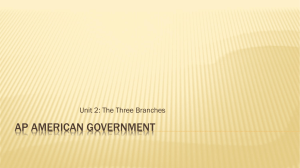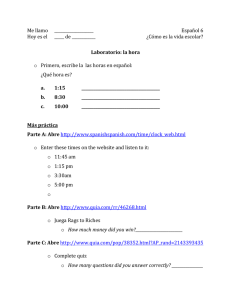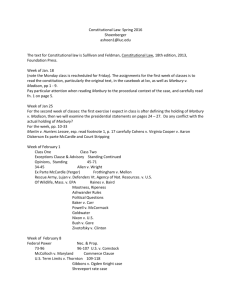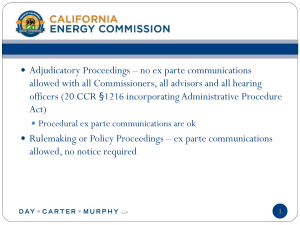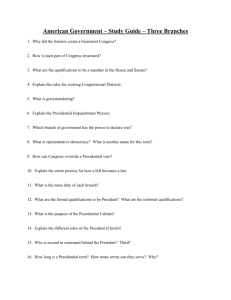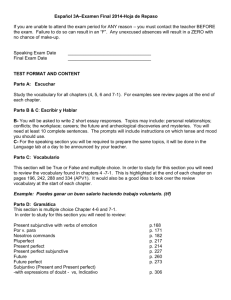PPT - University of San Diego Home Pages
advertisement
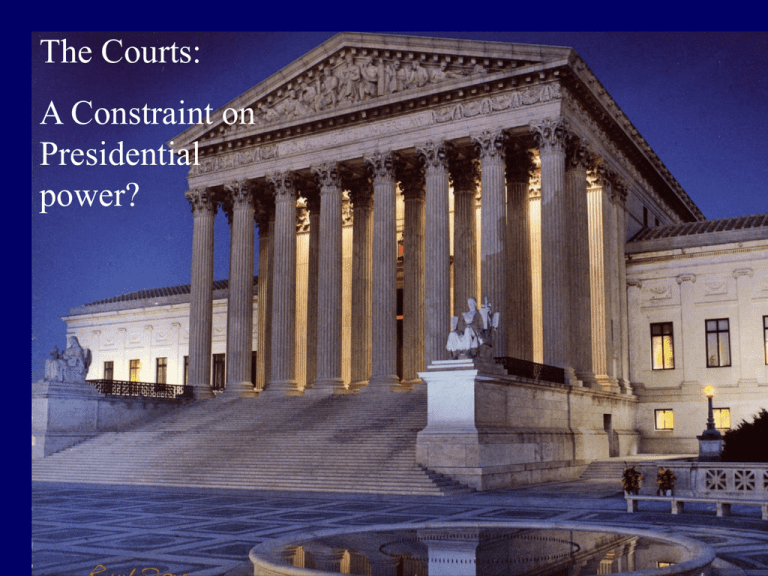
The Courts: A Constraint on Presidential power? The Courts: A constraint on presidential power? How have the courts served as a check (or expansion) of presidential power? The Court on Executive Power “A judge, like an executive adviser, may be surprised at the poverty of really useful and unambiguous authority applicable to concrete problems of executive power as they actually present themselves. Just what our forefathers did envision, or would have envisioned had they foreseen modern conditions, must be divined from materials almost as enigmatic as the dreams Joseph was called upon to interpret for Pharaoh. A century and a half of partisan debate and scholarly speculation yields no net result but only supplies more or less apt quotations from respected sources on each side of any question. They largely cancel each other. And court decisions are indecisive because of the judicial practice of dealing with the largest questions in the most narrow way.” –Justice Jackson, concurring, Youngstown Sheet and Tube v. Sawyer Deferential about war powers in wartime • Prize cases • Ex parte Milligan Ex parte Milligan • “During the late wicked Rebellion, the temper of the times did not allow that calmness in deliberation and discussion so necessary to a correct conclusion of a purely judicial question. Then, considerations of safety were mingled with the exercise of power…Now that the public safety is assured, this question as well as others can be discussed and decided without passion or the admixture of any element not required to form a legal judgment.” Deferential about war powers in wartime • Prize cases • Ex parte Milligan • US vs. Curtiss-Wright Export Corp. US vs. Curtiss-Wright Export Corp. “In this vast eternal realm, with its important, complicated, delicate, and manifold problems, the President alone has the power to speak or listen as a representative of the nation. He makes treaties with the advice and consent of the Senate, but he alone negotiates… US vs. Curtiss-Wright Export Corp. “It is important to bear in mind that we are here dealing not alone with an authority vested in the President by an exertion of legislative power but with such authority the very delicate, plenary, and exclusive power of the President as the sole organ of the federal government in the field of international relations—a power which does not require as a basis for its exercise an act of Congress…” Deferential in wartime? • • • • • Prize cases Ex parte Milligan US vs. Curtiss-Wright Export Corp. Korematsu Ex Parte Quirin Ex Parte Quirin • In writing the Articles of War, Congress… “recognize(s) the military commission appointed by military command as an appropriate tribunal for the trial and punishment of offenses against the law of war not ordinarily tried by court martial…By his order creating the Commission [the president] has undertaken to exercise the authority conferred upon him by Congress.” Deferential in wartime? • • • • • • Prize cases Ex parte Milligan US vs. Curtiss-Wright Export Corp. Korematsu Ex Parte Quirin Youngstown Sheet and Tube vs. Sawyer Jackson on Presidential Power “When the President acts pursuant to an express or implied authorization of Congress, his authority is at its maximum, for it includes all that he possesses in his own right plus all that Congress can delegate… Justice Jackson on Presidential Power “When the President acts in absence of either a congressional grant or denial of authority, he can only rely upon his own independent powers, but there is a ZONE OF TWILIGHT in which he and Congress may have concurrent authority or in which its distribution is uncertain… Jackson on Presidential Power “When the President takes measures incompatible with the expressed or implied will of Congress, his power is at its lowest ebb, for then he can rely only upon his own constitutional powers minus any constitutional powers of Congress over the matter.” --Justice Jackson, Concurrence, Youngstown Sheet and Tube Co. v. Sawyer Deferential in wartime? • • • • • • • • Prize cases Ex parte Milligan US vs. Curtiss-Wright Export Corp. Korematsu Ex Parte Quirin Youngstown Sheet and Tube vs. Sawyer Hamdi vs. Rumsfeld Hamdan vs. Rumsfeld Hamdi v. Rumsfeld • “We…hold that a citizen-detainee seeking to challenge his classification as an enemycombatant must receive notice of the factual basis for his classification and a fair opportunity to rebut the Government’s factual assertions before a neutral decisionmaker…At the same time…enemy combatant proceedings may be tailored to alleviate their uncommon potential to burden the Executive at a time of ongoing military conflict…” Hamdi v. Rumsfeld • “We reject the government’s assertion that separation of powers principles mandate a heavily circumscribed role for the courts in such circumstances. Indeed, the position that the courts must forgo any examination of the individual case and focus exclusively on the legality of the broader detention scheme cannot be mandated by any reasonable view of separation of powers, as this approach serves only to condense power into a single branch. We have long since made clear that a state of war is not a blank check for the President when it comes to the rights of the nation’s citizens.” Hamdan v. Rumsfeld • “Even assuming that Hamdan is a dangerous individual who would cause great harm or death to innocent civilians if given the opportunity, the Executive nevertheless must comply with the prevailing rule of law in undertaking to try him and subject him to criminal punishment.” Executive Privilege • US v. Nixon US v. Nixon • “The president’s need for complete candor and objectivity from his advisers calls for great deference from the Courts. However…absent a claim of need to protect military, diplomatic, or sensitive national security secrets, we find it difficult to accept the argument that even the very important interest in confidentiality of presidential communications is significantly diminished by production of such material for in camera inspection with all the protection that a district court will be obliged to provide.” Executive Privilege • Nixon • Clinton • Bush 43 Have the courts appropriately checked presidential power? If not, why not?
